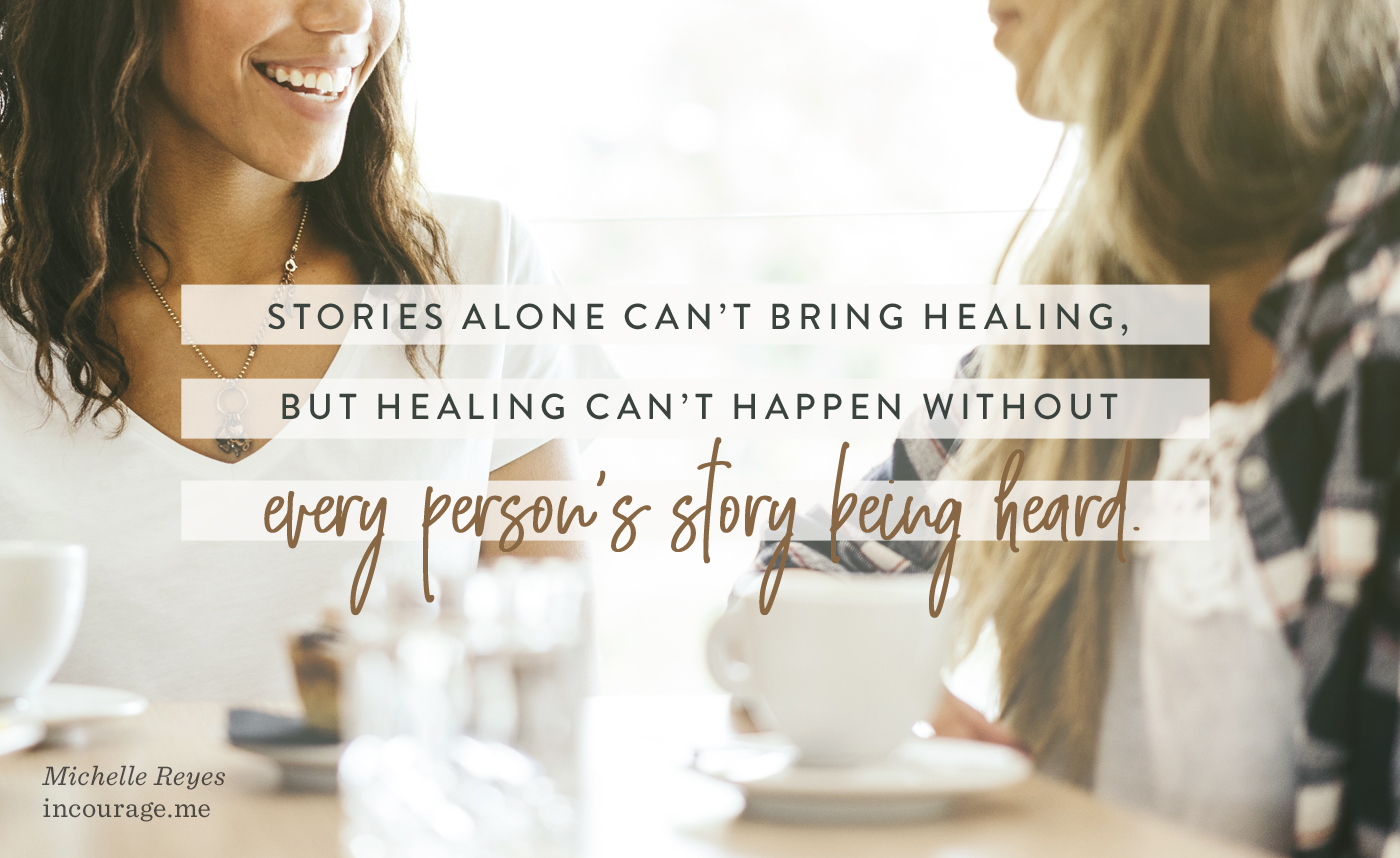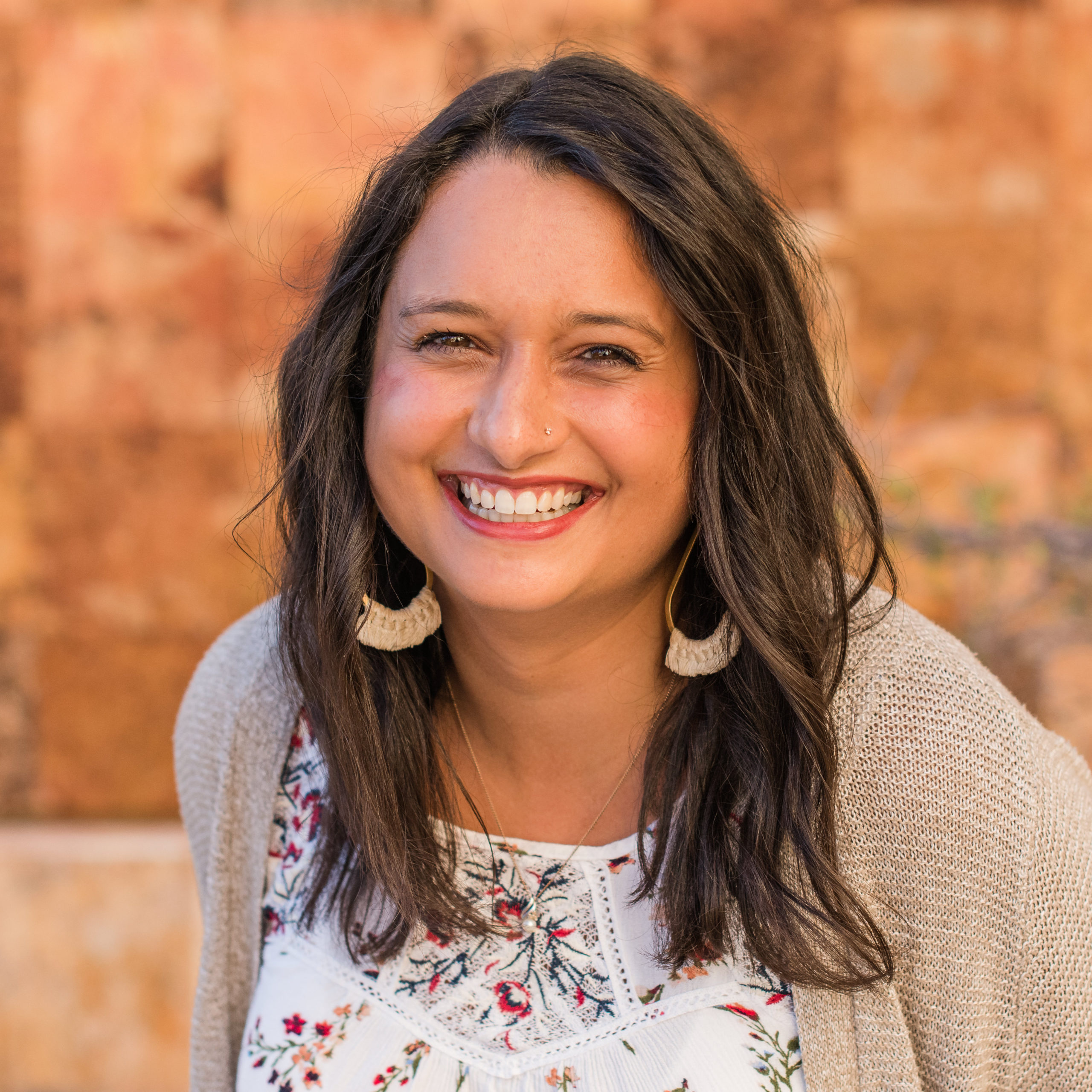“So, tell me about yourself.”
It was a simple enough question. I was talking with a woman I had just met the week before at church. In an effort to get to know each other better, we had joined up for a playdate with our babies and were now sitting on the floor amidst toys and a good deal of noise. Being a church planter and pastor’s wife, I was used to conversations that focus on other people’s lives. In truth, I assumed most of this hangout would be spent getting to know this lady, so I quickly rambled off a few facts about my life in Austin and our church before trying to place the proverbial ball back in her court.
But my new friend wanted to know more. Instead of answering my question, she continued, “You know, I’d really love to hear your story. Could you tell me more about your culture and what it means for you to be Indian?”
I was stunned.
No one really asks me that. But here was this woman I’d barely met wanting to know the real me. Not just Michelle, the church planter, or Michelle, the mom. She wanted more than a polite answer about my professional life and which Netflix show I was currently watching. Instead, it felt like she was passing me the mic and saying, “It’s your turn. Speak up.”
To my utter amazement, we spent much of our time together talking about the parts of me that I rarely express openly. We talked about cultural identity, my struggles as a woman of color, but also the things I take pride in as an Indian-American. We talked about how my faith and my culture intersect. She shared parts of her story too, but she mostly listened.
I had never felt more known or more seen from someone outside my own ethnic group.
In the midst of fraught racial relations in our country, asking someone to share their story is the first step toward healing. People tell me all the time, “I want to make friends of different cultures, but I don’t know where to start. What would we talk about? What if I say something wrong?” I truly believe that we need to start by first handing them the mic. We need to show people we want to hear their stories. Just as important, we need to show them we can also be silent while they speak.
At our core, we all want to be seen. We want people to understand our story, to believe that our experiences are true, to empathize with our pain, and to celebrate the beauty in our lives. This is particularly true when it comes to cross-cultural relationships, which are fraught with a pain-filled history, with power, oppression and marginalization. Stories alone can’t bring healing, but healing can’t happen without every person’s story being heard.
There are so many stories in Scripture where someone was abused, assaulted, or oppressed, and justice was given by allowing their story to be heard. God has always cared about our stories. This is the point of the book of Judges. It’s story after story of pain, including the assault, rape, and murder of an unnamed woman in Judges 19. What has always stood out to me is the fact that God says this woman’s story will never be forgotten. God challenges Israel, and by extension us, to be better listeners and give people the dignity of hearing their story.
Storytelling is a God-given right. Everyone has the right to talk about their experiences, their struggles, and their joys in their own words. Everyone has the right for their life to be understood in the context of what they’ve been through and in the context of their relationships with others, and even more so, everyone has the right for their experiences to be believed.
Healing, justice, and storytelling are all connected. That day, a relatively unknown woman gave me an incredible gift. She showed me my right in speaking about my life, and she conveyed such dignity and worth to me in the way she heard, empathized, and acknowledged my experiences. Though different from her own, she took my storytelling rights seriously and honored me as she listened. It’s perhaps unsurprising that she is one of my closest friends now today.
Do you want to build relationships across cultures? Do you feel passionate about pursuing racial solidarity? Is God calling you to break cycles of injustice? It is time for us, as sisters and believers, to pass the mic. We need to hear new voices. We need to hear all the voices so that we can begin creating a new narrative together as we move forward.
[bctt tweet=”In the midst of fraught racial relations in our country, asking someone to share their story is the first step toward healing. -@dr_reyes2:” username=”incourage”]
Leave a Comment






To often we can judge. Because we see people from Different parts of the world coming into our country. With different colors of skin. We can say why don’t they stay in their wone country. We as Christians have not judge them for coming into our country. If we listened to their storys had the kind of life they had we want out and better life for ourselves. As most of them come over here to get a better life for their friends themselves and their families. We should not be judging them we should be praying for them. I pray for them. As most of them don’t know Jesus or have not heard about Jesus. Like the kids song says Jesus loves all the Children of the world Red and Yellow Black and White. We as his followers are to do the same. Do as Jesus would want as to do be kind to them. If we handed them the mike. Heard their stories we maybe start to cry and want to put our hands round them and say Jesus loves you. Can I pray for you. Also it if we heard their stories and what they are going through it might make us more caring as God people. Plus more thank full. For all that he has given us. Also that we where never brought up in a contries like that. That we never had to suffer what theses people or kids go through. So let PRAY FOR THEM. Love Dawn Ferguson-Little xxxxx
Hi Dawn, I absolutely agree. It is not our right to judge, but rather to listen and to love. We must also remember our own history, and that each of us immigrated to this country at one point. That is also the story of our ancestors in the Bible. So, yes! I am with you. Let’s keep praying and staying rooted in God’s word.
I want to get serious about listening, Michelle. Hearing the hearts around us is a gift we give to our people, and sometimes all we have to do is ask a question and then be quiet. Interesting that the Hebrew for King Solomon’s “understanding heart” is, literally, “listening heart.”
Thank you, Michele. What a good reminder!
Thank you for your insight and a pattern to follow… pick up a mic. I like that!
Amen! It’s something we can all do. I’m glad these words could encourage you, sister!
Thanks for sharing this story, Michelle. The message that we all need time together in person in conversation is reverberating all around me these days. Our church is getting ready to launch a new way for women to do that and while I’m helping facilitate the conversations by introducing the topics, this reminds me that the most valuable thing we can do is give each woman a safe space to share her story. And if we feel awkward asking the “What’s it like for you to be __________ in our community?” may we remember that ultimately what matters isn’t asking the right question, but having a heart that sees others and wants to get to know them more. Maybe “asking questions in love” is as or even more important than speaking the truth in love. Thanks for sharing your story.
Amen! I love that, Melissa. This sounds like an incredible ministry, and I know women will feel both loved and empowered by just giving space for them to share their stories.
What a beautiful gift it is, to be able to share and hear each other’s stories! Thank you for this reminder today.
I have lots of stories to share (which weren’t particularly welcome until the Representation Matters movement last year!), and I am blessed to be in a community of women around the world who are experiencing things outside of their own cultures. It’s interesting to see how these can bring different perspectives on the word of God as well! 🙂
I’m so glad to hear this, Addie! Your story matters. Your voice is important. I am listening.
Hi Michelle,
Great message! As I read your story, I thought about God’s Word where Paul declares, “We are many parts, but one body” (1 Corinthians 12: 12-27 NIV). When we read these verses, we think about the many gifts that God has bestowed on us to build His Kingdom, which the scripture leads to. However, our many parts also demonstrate our many cultures and ethnicities. Not only does our gift build God’s Kingdom but our diversity illustrates how vast and wide (Ephesians 3:18 NIV) the supremacy of our Heavenly Father encompasses. You’re absolutely right that being able to share our story to someone initiates man’s healing process. Thanks for sharing. Charisse 🙂
I love this, Charisse, and completely agree. Each of our lives and our stories reflect a piece of God. Listening to others has deep, theological roots, and it’s part of what it means for us to love our brothers and sisters in Christ.
MIchelle,
God gave us two ears to hear & one mouth to speak. It is so easy to judge people by looking at them. Making snap decisions about people based on race or perceived thoughts. With global travel & international students coming here for schooling-it would behoove us to learn more about the various cultures. Don’t judge a whole group of people-ie: Muslims-based on a few people’s actions. Instead of letting fear get you talk to these people. Ask them deep questions about their country & how they feel living in our society. Then sit back & really listen. Take time to honestly understand their background & heritage. I know Jesus would do just that. He would take time out of His schedule to chat with people & get to know & understand them. How else can we love everyone as God loved us unless we first get to know them.
Blessings 🙂
I love your comment about two ears and one mouth. That’s awesome! Also, yes, this is why we need to smash cultural stereotypes. We are all individuals. We do not represent whole people groups. I share some similarities with other Indians, but I am also like no other Indian too. Comments like, “all white people…” or “all black people…” will never be true. That’s why we need to build relationships with people, and get to know them for who they are, not who we think they should be.
Thank you, Michelle. Our oldest daughter and her family left their home in rural US to minister to the First Peoples of BC. Your words are very helpful to share with others as we seek to build a home team for them in our local church.
Wow! That’s incredible! May God’s hand be over them as they minister, love, speak truth and listen to one another.